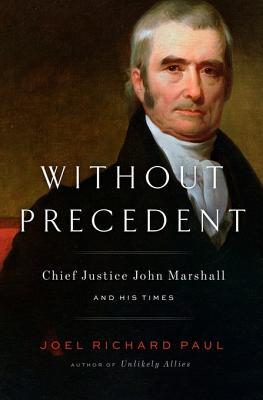
Without Precedent
Chief Justice John Marshall and His Times
کتاب های مرتبط
- اطلاعات
- نقد و بررسی
- دیدگاه کاربران
نقد و بررسی

October 1, 2017
A soldier with George Washington at Valley Forge, a Federalist as influential as his cousin Thomas Jefferson, secretary of state under John Adams, and our longest-serving chief justice, Founding Father John Marshall gets a big biography from Paul, professor of constitutional and international law at the University of California Hastings Law School. So, yes, readers will learn important things about the country's nascent justice system, but Paul also dives into the personal, from Marshall's staring-daggers relationship with Jefferson to his love for a wife who wished he would spend more time at home.
Copyright 2017 Library Journal, LLC Used with permission.

Starred review from December 18, 2017
In this comprehensive and insightful biography, Paul (Unlikely Allies), professor of constitutional and international law at UC-Hastings Law School, asserts that John Marshall (1755–1835), the fourth chief justice of the U.S., did more than anyone to “preserve the delicate unity of the fledgling republic.” While clearly a fan of his subject, Paul questions Marshall’s behavior, particularly his approach to slavery before and after he assumed the bench. Born of humble Virginia frontier origins, Marshall’s formal education was limited to a year of grammar school and six weeks of law school. Prior to his time on the high court, Marshall served under Washington at Valley Forge and was briefly a Virginia state representative before becoming secretary of state under John Adams. Marshall’s most famous decision during his record 34-year tenure as chief justice was Marbury v. Madison, which established the fundamental principle that courts had the authority to assess the constitutionality of a law. Positing that the decision was based on perjured testimony by Marshall’s brother James and that “the chief justice not only knew this but probably asked him to lie,” Paul explains and contextualizes the shocking ethical breach. Paul has produced an excellent treatment of an unquestionably impressive life. Agent: Roger S. Williams, Roger Williams Agency.

Starred review from December 15, 2017
A biography of the fourth and greatest chief justice of the United States.John Marshall (1755-1835) was no patrician. The eldest of 15 children born to an impoverished Virginia farmer, he had only a few months of formal education but served as a foot soldier at Valley Forge, a commissioner to France during the XYZ Affair, secretary of state to John Adams, and finally chief justice, a post to which Adams appointed him to resist the partisans of incoming president Thomas Jefferson. As Paul (Constitutional and International Law/Univ. of California Hastings Law School; Unlikely Allies: How a Merchant, a Playwright, and a Spy Saved the American Revolution, 2008) notes, Marshall took over a court that "was regarded as nothing more than a constitutional afterthought [with]...few cases, little dignity, and no genuine authority." He bolstered the court's prestige by inventing the majority decision and produced more than 1,000 unanimous decisions during his tenure, a testimony to his skills of persuasion and compromise. Often employing a form of political judo, Marshall expanded the authority of his court and the central government by establishing fundamental constitutional principles like judicial review, taken for granted today but hotly contested in that era, to the impotent rage of his partisan opponents. In his conduct of the 1807 treason trial of Aaron Burr, Marshall infuriated Jefferson but arguably "did more to secure free expression and prevent tyranny than any other court in our history." Much of the story necessarily focuses on abstruse issues in constitutional law, but the author turns this potential narrative problem into a strength by emphasizing the politics and personal stories underlying the court's landmark cases. He cheerfully draws readers into the factual and legal complexities involved, employing an easygoing prose style that neither condescends nor bogs down in legalese. As much as Paul admires Marshall, he doesn't shrink from exposing holes in his reasoning, occasional ethically dodgy procedure, and a sometimes dismayingly amoral approach to the law.A well-informed, perceptive, and absorbing biography of a titan of American history.
COPYRIGHT(2017) Kirkus Reviews, ALL RIGHTS RESERVED.

























دیدگاه کاربران